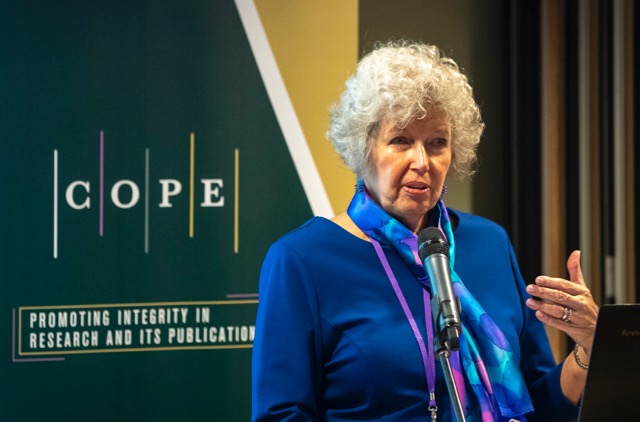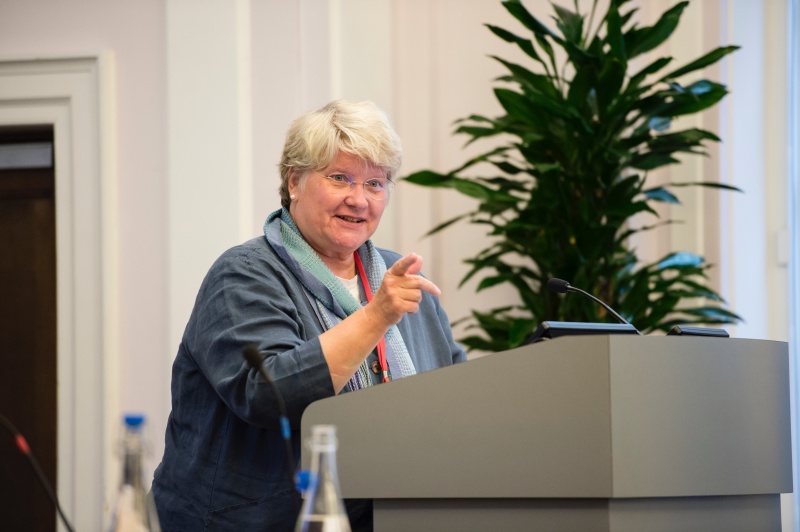We are seeking applications for two vacancies on the COPE Trustee Board as we look to enhance the support we provide. We have therefore highlighted gaps on the Trustee Board which we are keen to fill.
We are specifically seeking:
-
candidates with extensive experience and a proven record in open access publishing
-
candidates with in depth knowledge and experience of publishing in areas such as monographs, books, conference proceedings, theses, etc.
In accordance with COPE’s constitution, the candidate, or the organisation they represent, must have been an ordinary member of COPE for at least 1 year.
About the Trustee Board
The COPE Trustee Board is an active, working Board. As a Trustee, you will help ensure that the organisation complies with its governing document, organisation law, and any other relevant legislation or regulations. In addition, you will, with the other Trustees, set the strategic direction of COPE and ensure its financial stability (see COPE governance for more detail).
Key responsibilities
The Trustees meet four times a year; three of the meetings are held by webinar, with the other being a 3 day residential meeting incorporating the Annual General Meeting (AGM), Trustee Board, Council, and Subcommittee meetings. A full day dedicated to strategy is held once every three years. The residential meetings take place annually (May/June). It is expected that COPE Trustees will attend all of these meetings.
The Trustee Board and Council are comprised of a number of subcommittees, and a Trustee may be asked to lead or contribute to at least one of these, as appropriate, either actively in the case of a Trustee Board subcommittee or in an ex-officio capacity in the case of a Council subcommittee. It is anticipated that the work of Trustees amounts to about 3 hours per week depending on the activity at that time. This is in addition to attendance at meetings.
Terms of service
Trustees will be appointed for 3 years, with the possibility to stand for election for an additional 3 years. These are voluntary unpaid positions. It is expected that your employer will cover any expenses as part of your professional development; if this is not feasible, please contact the COPE Administrator for guidance.
Election process
Candidates for the Trustee Board will be shortlisted by the Trustee Board. Shortlisted candidates may be interviewed by telephone, or may be asked to complete a written interview. If the number of shortlisted candidates exceeds the number of vacancies, elections will take place. Trustees shall be elected by the Constitutional Members of COPE or (if the candidates are unopposed) by approval of the Trustee Board.
Role descriptions
The role descriptions for both positions are:
-
Trustee role requiring open access experience
Read full role description -
Trustee role with experience of monographs, books, conference proceedings, theses, etc
Read full role description
How to apply
Please email the COPE Administrator for more details on what is expected from Trustees, including details of how to apply.
The closing date for applications is: 8 May 2020
---------------------------------
Insights into the role of a COPE Trustee
 Chris Graf, Past co-Chair, on his time with COPE and giving back to the community:
Chris Graf, Past co-Chair, on his time with COPE and giving back to the community:
"I hope I’ve given as much to COPE and our community as I know I’ve received. It’s been more than a decade of deep learning for me, with great people. So if you’re thinking about volunteering then I can only recommend you do. But you’ll need to be ready to bring your expertise and time: there’s (good!) work to do, and COPE volunteers are who do it.
And you can look forward to gaining insights and to growing, when you do. For me, I’ve learned that publication ethics and research integrity aren’t abstract concepts, they’re practical needs for our everyday work.
At the end of the day, aspiring to better practice in publication ethics and research integrity means promoting respect for and between researchers, authors, peer reviewers, journal editors, and research administrators; it means supporting their best efforts to respect research participants, subjects, animals, and the environment; it means promoting respect among all stakeholders for the people who benefit from well conducted and well communicated research: us all. That’s of pretty central importance in our world, and it’s inspiring. Thanks, COPE, for everything!"

Charon Pierson reflects on her time as a COPE Trustee; how she discovered COPE, why she chose to volunteer with COPE and her experience of being on Council. Charon has recently stepped down from Council after volunteering as a Trustee for two terms.
"As a two-term Trustee on COPE Council, I can honestly say I believe I learned more than I contributed. I became aware of COPE when I was faced with several publication ethics problems in my journal and I found the information and support I needed in the COPE resources. I was also perplexed at the behaviour I was seeing from authors and wanted to learn more about how widespread plagiarism, duplicate publication, ghost authorship, and data fabrication/falsification was in the world of publishing. I found the quarterly Forum was an eye opener. When I realised the problem began with education of future scholars, I began to adapt existing COPE resources for educational presentations to my professional associations and my university. I discovered very few people in my discipline were aware of these issues and did not know about COPE or its resources.
I ran for Council, was elected, and immediately volunteered to serve on the Education subcommittee along with several other assignments. During my first term, COPE restructured its organisation and bylaws, and I became a Trustee and Secretary in 2015. This was a very busy two years as we worked to rewrite our rules and regulations to clarify and manage the structural issues that make COPE the fiscally responsible and respectable organisation that it continues to be. I served two terms as Secretary and continued to work on many projects and committees, learning all the time about the complex and difficult issues that drive the publication of scholarly work. The greatest excitement for me came from the intellectual yet practical discussions among our diverse Council Members as we attempted to provide a rational, fair, and balanced approach to every issue that emerged – and there were a lot of emerging issues in publication ethics between 2012 and 2019. I am very glad I was able to contribute to some of the great work of COPE."
 Geri Pearson, Past co-Chair, comments on the personal benefits of working with COPE:
Geri Pearson, Past co-Chair, comments on the personal benefits of working with COPE:
“All of my years involved with COPE Council, Trustees, and leadership have been filled with learning and the opportunity to meet colleagues I would not have encountered in my regular work.
COPE is compelling, complex, and fascinating. It has required diligence and hard work, pushing my comfort zone on leadership. The support and structure of COPE make it possible to function and grow in all roles.
Thank you to COPE for one of the best experiences I have ever had!"